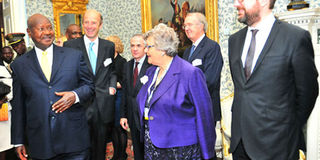Museveni calls for political mobilisation against Ebola

President Museveni talks to Baroness Lynda Chalker of Wallasey (C) and Mr Rupert Goodman in London yesterday. PHOTO BY PPU
What you need to know:
Victims. The disease was discovered in 1976. It has since claimed more than 4,000 lives in Sierra Leone, Guinea, Liberia and Nigeria
KAMPALA. President Museveni has called for increased political mobilisation and sensitisation against Ebola.
“The people of Uganda stand with their brothers and sisters in that region at this trying period as efforts are expended to contain and overcome the disease,” Mr Museveni said yesterday during an interview with BBC Radio and TV (English and Kiswahili) channels at his residence in Kensington in London where he is attending the Global African Infrastructure Summit (TGAIS).
President Museveni expressed sadness at the loss of lives in West Africa due to the Ebola outbreak
The outbreak first reported in March 2014 in West Africa, has rapidly become the deadliest occurrence of the disease since its discovery in 1976. It has since claimed more than 4,000 lives in Sierra Leone, Guinea, Liberia and Nigeria.
Mr Museveni urged all African governments to mobilise people and educate them to prevent spread of the disease. Ebola is spread mainly through contact with body fluids of an infected person or a corpse of one that has died of the disease.
In August, World Health Organisation (WHO) declared the West African Ebola outbreak an “international public health emergency”, saying a co-ordinated response was essential to halt the spread of the virus
Mr Museveni also emphasised that when people internalise the message against physical contact, the infection rate of the Ebola disease will be controlled as has been the case in Uganda where three Ebola outbreaks have been controlled.
Back home in Uganda, President Museveni has on several occasions asked his fellow citizens to take health warnings seriously if the country is to remain safe from Ebola.
Speaking at a public rally held in Kampala at the weekend, Mr Museveni said: “I don’t shake hands these days even with top officials because of diseases like Marburg and Ebola. I take health warnings seriously.”
Mr Museveni also advised: “Our traditional ways of handling bodies and sick people must take second place and let science take the first place so that a solution can be found fast.”
Meanwhile, the Director General for Health Services, Dr Jane Aceng, said the Ebola suspect reported over the weekend at Mulago hospital has tested negative from all the strains of Ebola and Marburg.
“The 45-year-old woman who returned from Sierra Leone and presented signs of Ebola has been tested and the results are negative,” said Dr Aceng, adding that the woman was diagnosed with malaria.


